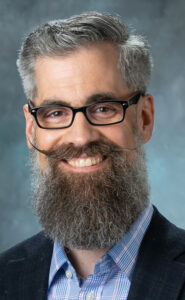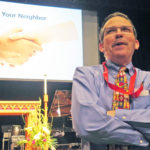By Matthew Coomber
I fondly remember the wonder I felt as a little boy during the baptismal liturgy. Light reflecting off water. The delicate sounds of its pouring. These were moments of beauty and peace in which I felt God’s presence. In the renewal of our baptismal vows, however, I was filled with awe. In childhood, that awe was rooted in being invited to participate in a rite that somehow seemed the domain of grown-ups. As a theologian and priest, those same vows fill me with awe at baptism’s restorative power.

The practice of baptizing our new members into the Church has a deep and fascinating history, which highlights the conversion experience the ceremony represents. Egyptian priests of the Isis Cult bathed and sprinkled new members with water to wash away their sins, Greek initiates entered the Eleusinian mysteries by taking a bath in the sea, and Roman inductees into the Mithraist mystery-religion were welcomed through ritual washing and receiving a mark on their foreheads.
It is no wonder that water plays a central role in many of our conversion rituals, through which initiates enter religious communities and seek access to the divine. Water can simultaneously represent new life (rains that make crops grow), cleansing (washing away impurity), and death (the seas that swallow and floods that drown). Water serves as a powerful element through which to symbolize leaving our former selves behind, as we are reborn into new life. Such transformative sentiments are expressed in the Catechism, describing baptism as a “gateway to life in the Spirit,” and an act through which “we are freed from sin and reborn as sons of God.” While the sacrament of baptism is experienced but once in our lives, it marks a transformative moment that can, and should, spark a conversion journey that takes us deeper into our faith. This theme of renewed faith has been present in our recent Sunday Gospel readings.
In both Mark 10:17-31 and 10: 35-45 we find Jesus working to renew and advance the faith of those who already believed in him. In Mark 10:17-22 Jesus sought to liberate the man of many possessions from his attachment to worldly treasures, which distract us from our relationships with God and with one another. Leaving those worldly treasures behind would be a painful process, as we saw in the man’s mourning, but a necessary step in order to bring his faith to the next level. If he followed Jesus’
instruction and returned to him — the story does not say — it would serve as a new conversion moment.
Again, in Mark 10:35-45 the Son of Man worked to increase the depth of James’ and John’s faith by correcting their misguided ideas about spiritual attainment. Whereas the brothers clearly saw faith as a competition of status, demanding that Jesus allow them to sit as his right and left hand, Christ led them to better understanding. Through teaching them that the nature of our spiritual work is service and not a scramble for honor and privilege, a central aspect of Roman social culture that led people to see others as rivals rather than neighbors, Jesus renewed their faith.
Both the man of many possessions and the brothers James and John already had faith in Christ. They had already sought Jesus’ counsel. Yet Jesus was offering them opportunities to experience a renewal of their conversions. Likewise, our conversions are continually in need of renewal.
The faith questions I had as a child, as a young adult, and now as a middle-aged person have not remained the same: they have grown along with me. Just as our personhood develops from infancy on into our senior years, our faith has the ability to mature and evolve so as to best nourish us through life’s different phases and needs. However, this does not happen on its own. It takes prayer, reflection, community and continually inviting Christ to enter our lives so that we may see the world, our neighbors, ourselves and our challenges, as God understands them to be. While baptism may be an once-in-a-lifetime event, the conversion moment it marks is not. It is the spark that ignites a wondrous journey that each of us walks with God and with the communion of saints.
As our faith grows, may we have the courage to nurture that faith which nurtures us. May we experience not one conversion, but many conversion moments as we work to renew continually the childlike wonder that we find in the presence of God and to be filled with awe at the restorative power that the sacrament of baptism holds.
(The Rev. Matthew J.M. Coomber, Ph.D., is a professor of Biblical Studies in the Theology Department of St. Ambrose University in Davenport He is co-director of The Center and Library for the Bible and Social Justice.)











